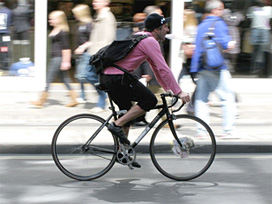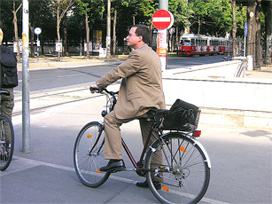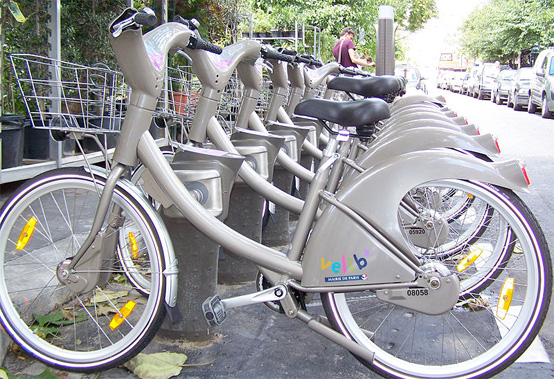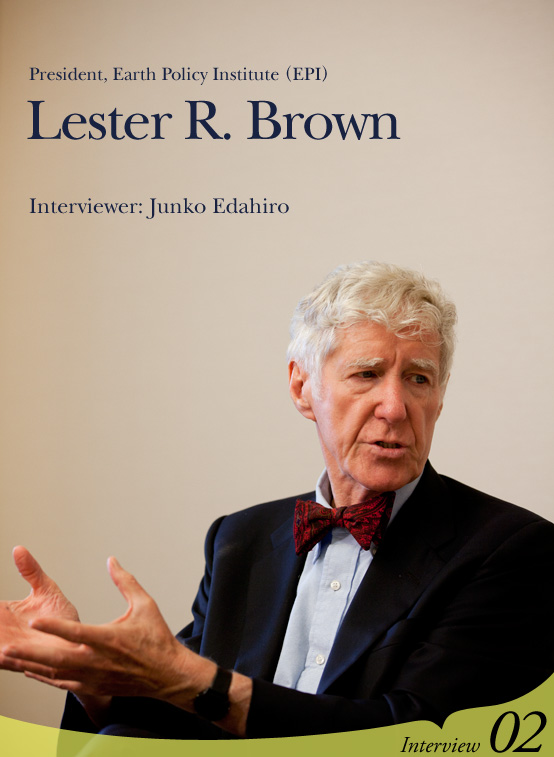- Junko :
- You have been working in the environmental field for years, talking about and attempting to change the situation with regard to agricultural methods, climate change, and so forth.
- We have to think about and tackle the big picture. We need to think about how society, the economy, and human well-being are all interconnected, and to become aware that that this interconnected structure itself has created many problems.
- Climate change, biodiversity loss and similar issues are not actually the problem. They are symptoms of the root causes. How do you see the situation of the environmental and sustainability issues humanity is facing?
- Lester :
- Clearly, if we continue doing what we are doing now, we are in trouble. I don't think the planet can sustain the sort of consumption patterns and trends that we now have. One of the things that's happened is that we've lost, I think, what happiness is. If we look at TV ads, happiness is consuming. "The more you consume, the happier you will be, and more popular you will be."
- But the things that make us happy, that make me happy, the things I derive so much satisfaction from don't have much to do with consumption. As long as I have enough food and a place to live, I am very happy, and in fact I am happy that I don't have a lot of things I have to spend my time looking after. If you have a big house and all the appliances and the yard, you spend all your time trying to maintain the things that are supposed to make you happy, but in fact make you work all the time.
- Junko :
- Yes, that's true.
- Lester :
- So I think we have to begin asking ourselves, "What is it that really makes us happy?" And once we start to ask that question, we will start getting answers to a lot of other questions as well.
- Junko :
- I would tend to agree. Why are people so occupied with consumption? Many people believe that consumption is a way to find happiness.
- Lester :
- Because we have a very effective educational system in the form of TV ads that we watch from the time we are little. They're all intended to get us to consume.
- No TV ads discourage consumption. They all encourage consumption. So we sort of grow up with this constant bombardment of messages saying "You need to consume" "You need to have this" "You need to have that."
- So it has become a very strong force shaping our lives. This idea that we need to consume, that we need to have the latest style of clothes, the latest-model cars, the latest toys and games, and so forth. We have to begin rethinking.
- Lester :
- There are signs that people are beginning to ask questions. I mean in the United States, for decades, each year the new houses built were getting bigger and bigger and bigger. Now they are starting to get smaller. Cars used to get bigger and bigger and bigger. Now they are starting to get smaller.
- Junko :
- Interesting.
- Lester :
- Some people are replacing cars with bicycles and discovering that it's more satisfying to bicycle to work than to drive to work, trying to find a parking place, and so forth.
- Junko :
- Do you believe the overconsumption driven by the bombardment of TV ads is one of the root causes of the many environmental issues?
- Lester :
- Well, I don't think there is any question about it. We consume so much energy to satisfy our needs. We have reached the point where we never ask the question, "Can I take a vacation near home and enjoy the things I haven't seen or I haven't done?" You know, you feel like you have to go half way around the world to have a vacation or else it doesn't count. So people fly from Europe to the Caribbean or from the United States to almost anywhere in the world. It is always some place else.
- So we need to ask ourselves what are the interesting things that we can do that do not involve using a lot of jet fuel, for example.


Some rights reserved by ProfDEH
- Lester :
- We used to see these huge projections of growth in air traveling in the future. We don't see those so much anymore. My own guess is that we are going to see, in many cases, decline of air travel.
- One of the areas we are seeing it is in the area of high speed railway development as in Europe and now in China. They are actually discontinuing air travel between some cities like Barcelona-Madrid or Brussels-Paris or, and some of the cities in China, because it is now faster to get on a train. No security lines to go through.
- Junko :
- That's Right.
- Lester :
- So changes are occurring. We are moving in the right direction. I don't think you have been to Washington lately, but we now have a bicycle system like in Paris, with about a hundred places with bicycles; you use a credit card to rent them.
- Junko :
- Really? Wow!
- Lester :
- And it has turned out to be very popular. We are now expanding it. We have already expanded it into the Virginia suburbs and probably going into the Maryland suburbs before long.
- Junko :
- Really. So does this decrease the number of cars inside the city?
- Lester :
- It certainly decreases the number of cars beyond what already was. The other thing to keep in mind, in terms of the number of cars in the city, is that we are slowly getting better public transit systems and bicycle-friendly trails and paths so people can commute by bicycle.

Velib', a public bicycle sharing system in Paris, France
Some rights reserved by Rcsmit





